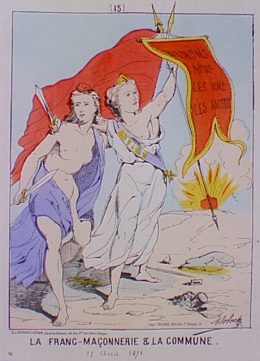 Distant Spanish echoes
Distant Spanish echoes
Michael Totten interviews Stephen Schwartz of the Centre for Islamic Pluralism. (Schwartz is the co-author of one of the most important books in English on the POUM, Spanish Marxism versus Soviet Communism with Victor Alba.)
Your Friend in the North on the Battle for Spain.
The King’s Speech
Is a pack of lies, says Isaac Chotiner, and Christopher Hitchens, and Hitchens again.
 “Progressive” [sic] politics
“Progressive” [sic] politics
At BobFromBrockley:
Shiraz Socialist publish a couple of shameful articles from the vaults of News Line, the paper of Gerry Healey’s Trotskyist cult the Workers Revolutionary Party. The articles, from 1983, exhibit a particularly disgusting brand of anti-Zionist antisemitism, portraying a reactionary Zionist web that stretches from the “rich Jews” who colluded with Hitler right through to rival Trot group Socialist Organiser, a conspiracy that silences opposition by playing its “anti-Semitic trump card” – phrases that have become all too common on the left. Anyway, the articles are relevant now because they contain a defence of the tyrant Muammar Gaddafi as anti-imperialist: try and swallow the words “in support of the Libyan masses under their leader Muammar Gaddafi.” And it is relevant to the “Progressive London” post because it generously quotes Ken Livingstone defending the WRP. Ken claims News Line “gives you an objective presentation of the news and political developments and supports the base struggles of the working class in industry and the community” and describes his enemies in the Labour Party as “agents of the Begin government”. I had forgotten how far back Ken goes with this “anti-imperialist” swamp. More on this sort of thing from Andrew Coates, David Osler and Michael Ezra and (from the archive) Sean Matgamna and Paul Anderson.
Also these two posts by Louis Proyect: “Qaddafi and the Left” and “Qaddafi and the Monthly Review” (re-posted at Kasama).
The new Stalinism
Darren Redstar on the new Stalinist witch-hunting of anarchists at Socialist Unity.
Pacifism: objectively pro-fascist, or objetively pro-imperialist?
Louis Proyect has a long piece attacking Gene Sharp (who I don’t know enough about to defend, although I find many of Louis’ accusations questionable). He includes this quote from the NYT:
Some people suspect Mr. Sharp of being a closet peacenik and a lefty — in the 1950s, he wrote for a publication called “Peace News” and he once worked as personal secretary to A. J. Muste, a noted labor union activist and pacifist — but he insists that he outgrew his own early pacifism and describes himself as “trans-partisan.”
Louis continues, interestingly, about AJ Muste, which struck me as interesting, given a discussion here a while back. Not often, I imagine, that Proyect and Michael Ezra are in agreement.
The Muste connection is interesting. In the 1930s, Muste was the leader of a group called the Workers Party that spearheaded major labor struggles. In James P. Cannon’s “History of American Trotskyism” there is a useful discussion of Muste’s importance. When Cannon found his own Trotskyist group growing closer to Muste’s, he broached the subject of a fusion that Muste was agreeable to. The Trotskyists were at that time doing what is called “entryism” in Norman Thomas’s Socialist Party. When they were expelled, they united with Muste as the Socialist Workers Party, reflecting each group’s antecedents.
Eventually Muste abandoned Marxism and became a Christian pacifist. As a leader of the Fellowship of Reconciliation, Muste became critical in the formation of the Vietnam antiwar coalitions that would challenge the imperialist war-makers. One crucial difference between Muste and Sharp was their chosen arena of struggle. Muste targeted his own government while Sharp saw his role as providing leadership to struggles elsewhere, particularly in the Soviet bloc countries. During the Korean War Sharp spent nine months in a federal prison in Danbury, Conn., as a conscientious objector. He also took part in some civil rights protests but from the 1960s onwards his emphasis has been on providing consultation to people in other countries.




























































 In a related vein, a great post from Rustbelt Radical:
In a related vein, a great post from Rustbelt Radical:  Distant Spanish echoes
Distant Spanish echoes